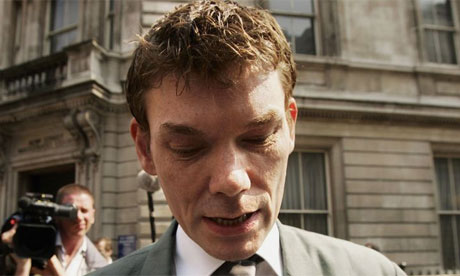Hacker Gary McKinnon loses appeal against extradition to US
• McKinnon's family and supporters express dismay at decision
• High court rules that Jacqui Smith had taken Asperger's into account
- guardian.co.uk, Friday 31 July 2009 12.23 BST
-
 larger | smaller
larger | smaller - Article history

Gary McKinnon admitted breaking into US military computers. Photograph: Getty
The British computer hacker Gary McKinnon failed today in his latest legal attempt to avoid extradition to the US where he could face a sentence of up to 60 years in a high-security prison.
The high court dismissed two claims for judicial review, dismaying McKinnon's family and supporters. Janis Sharp, his mother, said: "We are heartbroken. If the law says it's fair to destroy someone's life in this way, then it's a bad law."
McKinnon's lawyers said he would appeal against the decision while his mother asked Barack Obama to intervene.
Standing outside the high court, Sharp made a direct address to the US president. "Stand by us and make this world a better place, a more compassionate place," she said.
"Obama wouldn't have this. He doesn't want the first guy extradited for computer misuse to be a guy with Asperger's, a UFO guy. He wouldn't want this."
The high court decided to uphold a refusal by Keir Starmer, the director of public prosecutions, to sanction a trial of the 43-year-old "UFO eccentric" in Britain.
It also ruled that the former home secretary Jacqui Smith had taken into account McKinnon's Asperger's syndrome condition when considering the US extradition request.
McKinnon's lawyers had argued that extradition would lead to "disastrous consequences" for his health, including possible psychosis and suicide.
Lord Justice Stanley Burnton and Mr Justice Wilkie in a 41-page ruling said extradition was "a lawful and proportionate response to his offending".
The home secretary, Alan Johnson, said he would abide by the ruling. "It would be illegal for me to stop the extradition of Gary McKinnon, which the court ruling has made clear," he said.
"Mr McKinnon is accused of serious crimes and the US has a lawful right to seek his extradition, as we do when we wish to prosecute people who break our laws."
He added that it was open to McKinnon to seek to appeal to the House of Lords.
McKinnon's solicitor, Karen Todner, said she would lodge an appeal against the decision within 28 days and, if possible, take it to the new supreme court and even to Europe.
Whether a further appeal will be allowed will be decided at a later date. Burnton said it was a matter that should be dealt with "as expeditiously as possible", probably in September.
Todner described the ruling as "hugely disappointing", but she said the legal team would not be giving up. "Alan Johnson still has the power to act. We have 28 days to review the judgment and we will continue to explore every legal avenue until we achieve a just and proper result."
After the decision, Sharp said: "Our hope still lies with the government. What evidence do Gordon Brown and Alan Johnson need to understand what extraditing Gary would do to him, let alone us?
"Gary would not survive and I would not see my son again. All to oblige the Americans? If Gary's was such a dreadful crime, he should have been prosecuted and sentenced here years ago.
"Instead he's been left tortured by fear for seven years. Compassion can and must now prevail."
McKinnon has admitted hacking into the computer systems of the US defence department and Nasa, but his supporters argued his obsessions led to his misguided hacking activities from his flat in Wood Green, north London, and that he should be tried in Britain.
The Free Gary campaign has won the support of more than 100 MPs and received vociferous backing from the Daily Mail and celebrities such as as Bob Geldof, Chrissie Hynde, Barry Norman, Jilly Cooper and Julie Christie.
The government's independent reviewer of anti-terrorist legislation, Lord Carlile, intervened to say that prosecuting McKinnon in the US would be "cruel and unconscionable" because of his medical condition.
Gordon Brown's wife, Sarah, met McKinnon's mother to express her concern, while the prime minister last week said: "Anybody who looks at this must be sympathetic to someone who suffers from Asperger's syndrome."
McKinnon admitted hacking into 97 computers, leaving a message in US military systems saying: "I will continue to disrupt."
The US government said repairs cost $700,000 (£430,000) and the Crown Prosecution Service said his hacking activities were not random experiments in hacking but a deliberate effort to breach US defence systems in 2001-02.
McKinnon challenged Starmer's decision not to put him on trial in Britain. The hacker argued that extradition would have disastrous consequences, including possible psychosis and suicide because of his autistic spectrum medical condition.
McKinnon has spoken about his fears, saying that he wakes every morning "feeling as though someone has taken a sledgehammer to my chest during the night".
His lawyers argue that extradition arrangements between Britain and the US are imbalanced. Figures released this week to the Liberal Democrats in response to parliamentary questions reveal Britain has extradited twice as many criminal suspects to the US as those who have gone the other way.

No comments:
Post a Comment